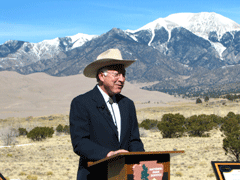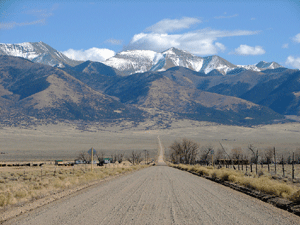All Hat and Lots of Cattle
Air Date: Week of February 20, 2009

The new Secretary of the Interior, Ken Salazar.(Photo: Tami Heilemann, DOI-NBC)
The Secretary of Interior is in charge of a fifth of all the land in the United States: all the national parks, grazing land, oil and gas and wildlife. The new chief, Ken Salazar, is a former state attorney general and water lawyer with deep roots in the Spanish Southwest. Living on Earth’s Ingrid Lobet reports.
Transcript
GELLERMAN: It’s Living on Earth, I’m Bruce Gellerman.
The Secretary of the Interior has authority over more than a fifth of the land in the United States and more than three times as much area off our shores.
That responsibility now rests with Ken Salazar. A former rancher and environmental lawyer, Salazar served as a Senator from Colorado before taking the reins as the nation’s biggest landlord.
Living on Earth’s Ingrid Lobet has this profile of the new secretary.
LOBET: In one of his first acts as Interior Secretary, Ken Salazar turned down bids from energy companies who wanted to drill on 77 pieces of land in Utah. The Bush administration had offered the land last December – part of a gas boom that's been going on in the West for a decade. Salazar said he wanted to take another look at the science.
SALAZAR: We need to make sure we protect our signature landscapes and cultural resources for future generations.
LOBET: Public lands advocates were thrilled. Next, Salazar put the brake on a Bush proposal for swift oil and gas development offshore.
SALAZAR: In my view it was a headlong rush of the worst kind.
LOBET: Now as Salazar begins to set his long-term policy, he'll be guided in part by his background. He comes from a Hispano family, people who've lived in the southwest since it belonged to Spain.
SALAZAR: They are proud people, twelve generations on the soils of New Mexico and Colorado.
LOBET: And as he spoke to fellow senators at his confirmation hearing, he noted how far he's come from his boyhood on their sheep and cattle ranch in one of the poorest counties in Colorado.
SALAZAR: Though they did not have opportunity to receive an education, all eight of their children became first generation college graduates.
LOBET: And then in his case, U.S. Senator and chief of the nation's national parks, grazing lands, oil leases and fish and wildlife.
[SOUND OF WALKING ON ICE]
TER KUILE: We are at a place called Gomez, and it’s one of the original Spanish settlements on the Alamosa River. And the river is totally frozen.
LOBET: Maya ter Kuile lives and works as a crop consultant in the San Luis Valley where Ken Salazar grew up.
TER KUILE: It is extremely dry, desert, but we're on the river corridor, where we have a stand of cottonwoods. And it was very handy to drive 15 minutes from your home and catch your limit of fish; and people are very self-sufficient, I mean this is not a wealthy area. The traditional thing was to can fish.

The San Luis Valley in Colorado. (Photo: Jesse Varner)
TER KUILE: Nobody from upstream warned us what was going on, it was just something that was happening, and if we hadn't been observant, we wouldn't have known what was going on.
LOBET: What they observed was that suddenly the river water they diverted and used on their fields was corrosive.
TER KUILE: The sprinkler systems were corroding, like on our farm and on our neighbors' farm.
LOBET: Federal scientists tested the river water in the Valley. It had a pH of three, as acidic as vinegar. By this time Ken Salazar was in Denver as Colorado's Chief of Natural Resources. Then in 1999 he became State Attorney General, went after the mine's former top executive, and won 25 million dollars to help restore the river.
SALAZAR: I believe strongly that those who pollute ought to pay and in this particular circumstance the litigation had not been pursued as fervently as it should have been.
LOBET: The mining disaster didn't affect the water on the Salazar ranch. But the events give Ken Salazar rare insight into a major issue in the west: mine pollution. Mining policy is no small part of his new job. And an exchange with Washington Senator Maria Cantwell during his confirmation hearings suggests he plans to make changes.
CANTWELL: My question is what will you do to support mining reform, including strong reform of the royalty regime?
SALAZAR: You know, the 1872 mining law, which I've worked on for a long time and know it well, is something that needs to be changed. It's amazing that over 130 years later, the law has not changed.
LOBET: Salazar did not say whether he thought multinational mining companies should have to pay royalties for the minerals they dig out of public land. And there are other contentious issues. Salazar's home state of Colorado has considerable deposits of what's called oil shale. This exchange with Senator Richard Burr of North Carolina, gives a hint of where the new Secretary stands on these heavier, dirtier sources of oil.
BURR: In December of ’05 D.O.I. issued five research and development grants on public lands, all of them in your state if I remember -
SALAZAR: Yeah I wish those oil shales were in your state, in the Carolinas -
BURR: Wish we had the oil shale. Under what circumstances are you willing to support commercial competitive leasing on public lands?
LOBET: Salazar said he's in no hurry.
SALAZAR: I mean it is rock, rock, rock. And we don't have the answers to some very important questions including how much water is it going to take? Two, how much energy is going to be consumed to melt the oil from the rock? None of those answers have been given to us yet.
LOBET: A go-slower approach toward extracting oil and gas on public land pleases
environmental activists and Senator Ron Wyden of Oregon.
WYDEN: The Bush administration just flung open the doors to our public lands and invited oil, gas and extraction industries to take whatever they wanted. I see this as a task for the Obama administration and Secretary Salazar, to put the public back into public lands – into managing them for the good of the country, and not just a handful of powerful special interests.
LOBET: There are other views. Rob Rivett of the Pacific Legal Foundation says given the economy, this is no time to be holding back on energy made in the USA.
RIVETT: When it comes to development of energy resources – cheaper energy – people need that. So the public lands have those resources and there has to be a balance! You have to take a look at what the impacts of the development are as well as the benefits of the development. Wind, and geothermal, and solar can’t provide the balance of energy needs.
LOBET: As Salazar gets his full team in place, another important file in his portfolio is endangered species. One extremely controversial issue is wolf protection, especially among ranchers, whose livestock can be wolves' preferred prey. Though Salazar is a former rancher, he declined to tell Senator Barrasso of Wyoming what action he plans.

During a visit to Great Sand Dunes National Park and Preserve, Secretary of the Interior Ken Salazar discusses job creation at national parks and wildlife refuges. (Photo: Tami Heilemann, DOI-NBC)
SALAZAR: The Endangered Species is an important law and I think it has in fact worked in a way to preserve God’s given creations so that your children and my children and our grandchildren will be able to see that creation here on this earth.
LOBET: Habitat for endangered animals is not, of course, just a ranchers' issue. Last year the Fish And Wildlife Service decided that polar bears are threatened by the shrinking of Arctic sea ice. That decision could be relevant for every industry that generates carbon dioxide and contributes to climate change. And that, says Rob Rivett of the Pacific Legal Foundation, is his greatest concern about Ken Salazar.
RIVETT: Well now, this agency has the ability to change the current rules and suggest that any action that is emitting CO2 has to evaluate and mitigate for that, on the grounds that it may damage the habitat to the polar bear. There could be significant costs imposed on the development of our natural resources.
LOBET: To date Secretary Salazar's approach to that development does look more measured than his predecessor's. His policy isn't crystal clear yet; he's still dealing with behavior from the last Interior Department that may yet merit prosecution. So it could be a while before he’s able to get to one thing he says he hopes will be his crown jewel - a nationwide youth conservation program.
For Living On Earth, I'm Ingrid Lobet
Links
Living on Earth wants to hear from you!
Living on Earth
62 Calef Highway, Suite 212
Lee, NH 03861
Telephone: 617-287-4121
E-mail: comments@loe.org
Newsletter [Click here]
Donate to Living on Earth!
Living on Earth is an independent media program and relies entirely on contributions from listeners and institutions supporting public service. Please donate now to preserve an independent environmental voice.
NewsletterLiving on Earth offers a weekly delivery of the show's rundown to your mailbox. Sign up for our newsletter today!
 Sailors For The Sea: Be the change you want to sea.
Sailors For The Sea: Be the change you want to sea.
 The Grantham Foundation for the Protection of the Environment: Committed to protecting and improving the health of the global environment.
The Grantham Foundation for the Protection of the Environment: Committed to protecting and improving the health of the global environment.
 Contribute to Living on Earth and receive, as our gift to you, an archival print of one of Mark Seth Lender's extraordinary wildlife photographs. Follow the link to see Mark's current collection of photographs.
Contribute to Living on Earth and receive, as our gift to you, an archival print of one of Mark Seth Lender's extraordinary wildlife photographs. Follow the link to see Mark's current collection of photographs.
 Buy a signed copy of Mark Seth Lender's book Smeagull the Seagull & support Living on Earth
Buy a signed copy of Mark Seth Lender's book Smeagull the Seagull & support Living on Earth

